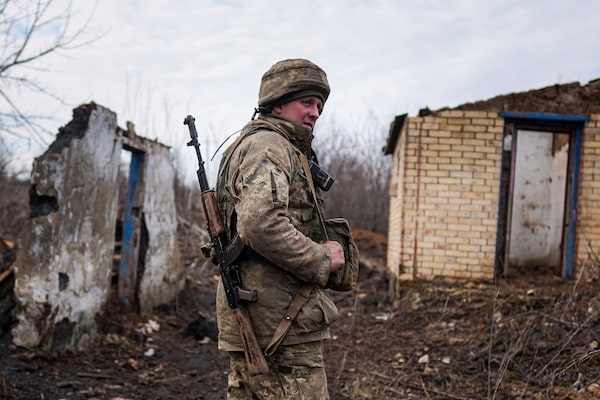
A Ukrainian serviceman stands at his position at the line of separation between Ukraine-held territory and rebel-held territory near Svitlodarsk, eastern Ukraine, on Feb. 23.Evgeniy Maloletka/The Associated Press
Canada warned this week it has a package of additional sanctions ready to impose on Russia if Moscow proceeds with a further invasion of Ukraine.
Foreign Affairs Minister Mélanie Joly has said Ottawa is standing by to “target even more of Russia’s financial sector and oligarchs” as well as “significant announcements related to Canadian exports to Russia.”
This would be on top of the sanctions against two Russian banks – VEB and PSB – and measures targeting members of Russia’s lower house of parliament announced by Canada in concert with allies on Wednesday.
Lawyer John Boscariol, head of McCarthy Tétrault’s international trade and investment law group, said one area where Canada could squeeze Russia would be to further restrict exports of equipment destined for oil and gas development. The Russian government is heavily dependent on oil and gas revenue. Ottawa could expand sanctions “to all products that go to oil and gas development in Russia,” he said.
Mr. Boscariol said the statements to date from Canada do not suggest Ottawa is considering barring Canadians from providing financial services to Russians. That would be a “huge hammer” if they did that, he said. Sanctions in place today bar Canadian banks from providing these services to Syria and North Korea.
Russian-Ukraine war live updates
Canada pressed to offer Ukrainians visa-free access as possible war looms
Canada to send more troops to Europe, slap fresh sanctions on Russia over Ukraine
A significant number of oligarchs and government officials alleged to be close to Russian President Vladimir Putin remain untouched by sanctions.
For instance, only five individuals on a list of 35 people drawn up by allies of jailed Kremlin critic Alexey Navalny have so far been subject to sanctions by Western countries – in some cases, only by one or two countries. This list of proposed targets names wealthy Russians, government officials and business leaders who Mr. Navalny’s supporters say should face sanctions to put pressure on Mr. Putin.
Mr. Navalny, one of Mr. Putin’s most prominent opponents, created an organization to rally against political corruption in Russia. He was jailed in 2021 for alleged parole violations in a decision the West has condemned as politically motivated. This detention came months after Mr. Navalny was poisoned with a Soviet-era military-grade nerve agent – an attack he blamed on Mr. Putin.
No. 1 on the list prepared by Mr. Navalny’s allies is Russian-Israeli billionaire Roman Abramovich, owner of England’s Chelsea soccer club and a major shareholder in Evraz PLC, which through a subsidiary has steel-production facilities in Canada.
Mr. Abramovich owns more than 28 per cent of the shares of Evraz PLC, according to the company’s website. Its wholly owned subsidiary Evraz North America operates steel-production sites in the United States and Canada, including locations in Regina and the Alberta cities of Calgary, Camrose and Red Deer.
The Russian billionaire’s name came up in Britain this week when British Prime Minister Boris Johnson mistakenly identified him as someone who was “already facing sanctions.” The British Broadcasting Corp. reported that a spokesman for the Prime Minster later said Mr. Johnson misspoke.
Mr. Abramovich last year sued publishing house HarperCollins over a book that said he bought Chelsea at the direction of Mr. Putin and to raise Russia’s profile and increase its influence. Last December, as part of a settlement, the publisher agreed to amend certain passages relating to the reasons for buying the Chelsea club.
It’s not clear that Evraz would be a candidate for sanctions given that Canada or other governments would have to determine that Mr. Abramovich controls it even though he holds less than 30 per cent. The company did not immediately respond to a request for comment Wednesday on the prospect of sanctions. In 2019, Evraz said publicly that a decision by Mr. Abramovich and his partners to sell some of their shares in the group would reduce the risks of the company itself being subject to sanctions.
Conservative foreign-affairs critic Michael Chong said he would like to see Canada restrict access to this country’s airwaves for RT, formerly known as Russia Today, a Kremlin-controlled news channel that is part of Russia’s propaganda machine.
Mr. Boscariol said a “nuclear option” for Canada would be to place Russia on its Area Control List, which would severely restrict exports because it would require permits for the shipment of any good or technology to Russia. “That would apply to everything including pencils,” Mr. Boscariol said.
In 2021, Canada exported $656-million in merchandise to Russia, according to Sabrine Barakat with the Department of Global Affairs. The latest year available for services trade was 2020, when Canada exported $275-million in services to Russia, she said.
Russia in turn exported $2.1-billion in merchandise to Canada in 2021; the services trade, for which only 2020 data are available, amounted to $731-million in sales to Canada. The amount of Canadian direct investment in Russia was valued at $782-million in 2020, while Russian investment in Canada was valued at $1.8-billion.
Since Russia’s annexation of Crimea in 2014, Canada has imposed sanctions on more than 440 individuals and entities, with many of these sanctions applied in co-ordination with its allies. Canada’s sanctions impose asset freezes and dealings prohibitions on the targets.
With a report from Reuters
Our Morning Update and Evening Update newsletters are written by Globe editors, giving you a concise summary of the day’s most important headlines. Sign up today.
 Steven Chase
Steven Chase